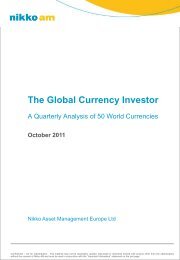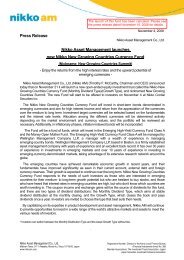download pdf - Nikko Asset Management, Nikko AM
download pdf - Nikko Asset Management, Nikko AM
download pdf - Nikko Asset Management, Nikko AM
You also want an ePaper? Increase the reach of your titles
YUMPU automatically turns print PDFs into web optimized ePapers that Google loves.
THE WEEK OF JUNE 24, 2013<br />
MANAGING YOUR MONEY<br />
personalWEALTH<br />
Wealth trends<br />
Profit challenge for wealth<br />
management firms<br />
Hedge funds<br />
Commodity traders mostly in<br />
the red in gloomy 1H2013<br />
Collectibles<br />
For China’s fine-wine buyers,<br />
fakes are more worrying<br />
than tariffs<br />
Japan to<br />
rise again<br />
Despite the recent slump, stocks in the<br />
Land of the Rising Sun will surge again<br />
and resume their uptrend, predicts<br />
<strong>Nikko</strong>’s Takashi Maruyama. He is<br />
positive on carmakers, banks,<br />
real estate companies and<br />
high-dividend-yielding counters.<br />
Reproduced by permission of The Edge Publishing Pte Ltd., Copyright © 2013 The Edge Publishing Pte Ltd. All Rights Reserved Worldwide.
PW4 • THEEDGE SINGAPORE | JUNE 24, 2013<br />
PERSONAL WEALTH<br />
COVERSTORY<br />
At below 14 times forward PER, valuations of Japanese<br />
equities have moved to an attractive level after the<br />
recent correction, says Maruyama<br />
PICTURES: BLOOMBERG<br />
Japan to rise again<br />
Despite the recent slump, stocks in the Land of the Rising Sun will surge again and resume their uptrend, predicts <strong>Nikko</strong>’s<br />
Takashi Maruyama. He is positive on carmakers, banks, real estate companies and high-dividend-yielding counters.<br />
| BY KELVIN TAN |<br />
Seasoned angler Takashi<br />
Maruyama, who is fond of<br />
fishing in Japan’s fast-flowing<br />
rivers, knows the tricks<br />
to a good catch are finding<br />
the right spots, choosing the correct<br />
lure, having the endurance to play<br />
the waiting game and knowing when<br />
to reel the catch in.<br />
Good fishing, like successful investing,<br />
requires discipline and patience<br />
even during difficult weather<br />
conditions, according to Maruyama,<br />
who is head of equity fund management<br />
at <strong>Nikko</strong> <strong>Asset</strong> <strong>Management</strong>.<br />
That is why the recent turbulence<br />
that threatens to derail the equity<br />
upswing in Japan doesn’t seem to<br />
unnerve him.<br />
Japanese stocks — as measured by<br />
the Nikkei 225 Index — have slumped<br />
more than 15% from their 5½-year<br />
peak on May 23 on concerns that<br />
global central banks such as the US<br />
Federal Reserve may ease their monetary<br />
stimulus in the near future. The<br />
recent strength in the yen has also increased<br />
selling pressure on stocks in<br />
Japan. The ongoing Japanese stock<br />
market correction, however, is unavoidable,<br />
says the 48-year-old, Tokyo-based<br />
fund manager in an interview<br />
with Personal Wealth when he<br />
was in town recently.<br />
The surge in the prices of Japanese<br />
equities, which skyrocketed<br />
more than 50% in the six months<br />
prior to the recent downturn, was<br />
simply too fast, he observes. “Six<br />
months before May 23, Japanese<br />
equities generated gains of around<br />
70%. On an annualised basis, that<br />
was 140% and that was too much.<br />
We didn’t expect that type of speed<br />
in the rally.”<br />
As Maruyama sees it, the chilling<br />
winds sweeping across the Japanese<br />
stock market is transitional and unlikely<br />
to develop into a tempest. He<br />
says the market needs a short-term<br />
correction before it can gradually<br />
move higher on fundamental reasons<br />
such as better-than-expected<br />
corporate earnings, improving economic<br />
growth and business activities,<br />
and confidence-boosting structural<br />
reforms advocated by Japan<br />
Prime Minister Shinzo Abe. “After<br />
this correction, I think Japanese equities<br />
will go up again. But the pace<br />
of the rally will be slower than the<br />
previous one,” he predicts.<br />
Maruyama adds that with the recent<br />
slump, valuations of Japanese<br />
equities are now at an attractive level<br />
of below 14 times forward price-toearnings<br />
ratio (PER) compared with<br />
the historical average PER for the Japan<br />
Topix Index of around 17 times.<br />
At current prices, Japanese stocks<br />
look cheap relative to their historical<br />
valuations, he points out.<br />
Maruyama says investment sentiment in<br />
Japan could improve in June if Abe’s LDP<br />
wins the majority in the Upper House<br />
election<br />
But cheap valuations will not<br />
drive up stock prices. “For earnings<br />
of Japanese companies, the currency<br />
rate is extremely important. Due<br />
to Abenomics, the correction of the<br />
strong yen took place. On the back<br />
of that, we will see positive surprises<br />
in earnings in the future. That<br />
will be the main driver for Japanese<br />
equities.”<br />
Abenomics refers to the aggressive,<br />
pro-growth reflationary economic policies<br />
advocated by Abe, who has vowed<br />
to end Japan’s prolonged period of deflation<br />
by setting an inflation target of<br />
2% within two years and a nominal<br />
GDP growth target of 3%.<br />
Since becoming Japan’s prime minister<br />
for the second time in December,<br />
Abe has introduced bold stimulus<br />
policies that have sent the yen<br />
plunging in value against the US dollar.<br />
Despite its recent strength — the<br />
yen has rebounded from its low of<br />
103.5 to the US dollar on May 22 to<br />
around 95 currently — it is still more<br />
than 15% lower against the greenback<br />
since early December.<br />
“The intention of Abenomics<br />
is to correct the strong yen,” says<br />
Maruyama, who reckons it will weaken<br />
to the 99 to 100 level when the<br />
market turbulence subsides.<br />
Bullish on autos, banks and<br />
real estate<br />
A weakening yen will boost the competitiveness<br />
of many exporting Japanese<br />
companies, according to the<br />
<strong>Nikko</strong> fund manager.<br />
“As long as the exporters have<br />
good business because of the weaker<br />
yen, sentiment and business activities<br />
in Japan will be boosted,” says<br />
Maruyama. He is bullish on Japanese<br />
carmakers, automobile-related equipment<br />
makers and select consumer<br />
electronics manufacturers, but will<br />
not name individual stocks.<br />
The fund house’s <strong>Nikko</strong> Shenton<br />
Japan Fund, a Japanese equity unit<br />
trust that is sold to retail investors in<br />
Singapore, has Toyota Motor Corp,<br />
Honda Motor Co and Mazda Motor<br />
Reproduced by permission of The Edge Publishing Pte Ltd., Copyright © 2013 The Edge Publishing Pte Ltd. All Rights Reserved Worldwide.<br />
S<strong>AM</strong>UEL ISAAC CHUA/THE EDGE SINGAPORE<br />
Corp among its top 10 holdings.<br />
At current prices, Japanese banks<br />
are also looking like good buys, says<br />
Maruyama. “It is a very traditional<br />
way of thinking, but when the Japanese<br />
economy turns for the better,<br />
Japanese banks will do very well. In<br />
terms of valuations, Japanese banks<br />
look attractive,” Maruyama says. The<br />
country’s strong economic growth of<br />
an annualised 4.1% in 1Q surprised<br />
many economists.<br />
With Japan, the world’s third largest<br />
economy, on the mend, Maruyama<br />
reckons bank lending activities<br />
will pick up and boost the interest<br />
margins of its banks. A better economic<br />
outlook for the country will<br />
push companies into an expansionary<br />
mode and capital expenditure is<br />
likely to go up. “Many cash-rich Japanese<br />
companies will finance capital<br />
expenditure with their own cash. But<br />
eventually, they will have to borrow<br />
money from the banks,” he tells Personal<br />
Wealth. Bank lending in Japan<br />
was up 2.1% in April compared with<br />
the same month last year.<br />
Banks and financial companies,<br />
which are among the top 10 holdings<br />
of the <strong>Nikko</strong> Shenton Japan Fund, include<br />
Mitsubishi UFJ Financial Group,<br />
Mizuho Financial Group and Nomura<br />
Holdings. The fund also holds a<br />
large amount of shares in real estate<br />
companies such as Mitsui Fudosan<br />
Co and Mitsubishi Estate Co.
is likely to rebound towards the latter part (JGB) are concerned, the recent spike in although loans to small and medium-sized<br />
CONTINUES ON PW8<br />
THEEDGE SINGAPORE | JUNE 24, 2013 • PW5<br />
As Maruyama sees it, Japanese rate restructuring is over and they<br />
PERSONAL tional WEALTH income and set up regional<br />
real estate companies will be the can increase workers’ salaries and<br />
economic zones. He is expected to<br />
main beneficiaries of the Bank of Japan’s<br />
many companies have done that.<br />
announce more structural reforms<br />
aggressive reflationary policies. That means they can afford to in-<br />
soon, according to Maruyama. “The<br />
In April,<br />
Why<br />
the central bank<br />
are<br />
launched a crease<br />
Japanese<br />
the dividends to their shareholders.bour<br />
law reforms because of the tim-<br />
stocks fluctuating<br />
recent<br />
wildly?<br />
Abe speech didn’t include la-<br />
massive bond-buying programme in a<br />
bid to stimulate the Japanese economy At the same time, the firms’ positive<br />
ing, with the Upper House election<br />
and take it out of decades of stagnation.<br />
earnings growth will boost divi-<br />
just around the corner.”<br />
Quantitative easing moves announced<br />
dend payouts, he says. In addition,<br />
The fund manager reckons dereg-<br />
Over by BOJ then the included past weeks, plans there Japanese has companies of the year. are Lower “very commodity cash<br />
yields should not be seen as companies ulation have remained of Japan’s sluggish. strict labour Unlike laws<br />
to buy ¥7.5 trillion been ($99.1 extreme billion) volatility of in rich”. Japanese<br />
equities and double and the many balance inves-<br />
sheets. ers and They we have have to seen think a sharp<br />
flect heightened speculative acdled<br />
with huge “Historically, amounts the of non-performing<br />
labour laws Ja-<br />
“They prices hold lots are of positive cash in for their consum-<br />
the start of a crisis. It may re-<br />
in the 1990s will when be good Japanese for its banks corporate were sad-<br />
sector.<br />
bonds each month<br />
monetary base tors from have ¥138 raised trillion the at question about of how rebound they are in going US consumer to spend confidence<br />
During recently. deflationary Most European<br />
relatively illiquid market. Most lending and companies are in a more cannot resilient let go of position their emtivity<br />
by leveraged players in a loans, they pan now have have been the capital very strict. to expand Japanese<br />
end-2012 to ¥270 whether trillion we by end-2014. have seen the that best money.<br />
Besides from purchasing the Nikkei. Japanese government<br />
bonds The volatility across the in maturity the market spec-<br />
started flation with is expected fiscal tightening, in Japan in and the the lat-<br />
yield owing to the increased The housing Even market though has the also companies shown signs would<br />
times, cash governments is king.” However, are relaxing in-<br />
their<br />
of the jump in JGBs is in real against external ployees shocks. with remuneration packages.<br />
trum, the BOJ rise will in Japanese also buy government-bond commercial near yields future est and news it will is be that a problem, the European<br />
inflation expectations. of recovery. like Housing to pay starts the rose workers 7% y-o-y to leave, in<br />
papers, and general corporate profit-taking bonds, exchangetradeticipation<br />
funds of and retail Japanese investors. real es-<br />
<strong>Nikko</strong> <strong>Asset</strong> Spain <strong>Management</strong> two more years recent-<br />
to bring<br />
its monetary base and raise the creases. The have higher to continue demand for to property hire them has even<br />
led by the high Maruyama par-<br />
Union says. just granted France and<br />
With the BOJ trying to double March, the it seventh cannot consecutive be done. The month companies of intate<br />
investment The global trusts bond as market part of has its been ly rolled going out their Japan fiscal deficits Dividend in Equity<br />
There Fund, EU giving rules. retail investors in | BY RAYMOND CHAN | argue that Japanese yields will ues, particularly he explains.<br />
Tokyo.<br />
line with<br />
inflation rate to 2%, we could started to translate though into their gains skills in are property not needed,” val-<br />
asset through buying a programme.<br />
correction in recent weeks.<br />
are “The concerns BOJ will bond be active yields and will con-continutinue move to higher be active and in the the rally future. we have anese seen in companies’ to slow higher its aggressive dividend stimuage<br />
banks to lend and re-flate BOJ governor the Haruhiko Upper House, Kuroda the upside could for lead Jap-<br />
Singapore to an opportunity Worries the to Fed tap may Jap-<br />
begin<br />
need to rise in order to encour-<br />
It is possible Should that the Abe efforts win the by Abe majority and of<br />
That’s risk why markets I am will positive be derailed. on Japanese<br />
should real estate put the stocks fall in bond based prices on a in its invest prop-<br />
in about believe 50 the dividend money-printing stocks, presses will run Yields are expected to be less volatile in the bubble, but yama we should says. note Abenomics that ownership will take of at<br />
However, payouts. we The lus unit efforts trust, also which sent bond will yields higher. We the economy.<br />
to the bursting anese of the stocks Japanese will be bond-market huge, Maru-<br />
reflationary er perspective. story,” US says bond the yields <strong>Nikko</strong> have aims only to re-distributcovered of equity to levels fund last management,<br />
seen early this year 5% to and 7%. reason The distribution central bankers will be in developed econotune<br />
its buying operations. It plans to have countries that pact, experienced and if the country’s debt turmoil. economic In<br />
longer than annual most payouts investors of suspect. The main coming months as the BOJ continues to fine-<br />
this market least in Japan two is years different to have from a other full im-<br />
head<br />
who are points still well out that below real their estate 2011 prices<br />
in Japan We believe began Treasury to inch higher yields may re-<br />
have “The lim-<br />
high-dividend-yielding short-circuit a deflationary strat-<br />
cycle and, in do-<br />
smaller amounts each time to allow dealers eigners, whereas more people in the US will Treasury have confidence market, in<br />
highs. done on a monthly mies are basis. pursuing quantitative easing is to more frequent operations and to purchase Japan, less growth than 10% continues of debt is to held gain by traction, forcentlyited<br />
room “Actual to rise real in estate the shorter prices in term. egy The will US work ing for so, Japan prevent over their long economies from falling to manage their inventories better.<br />
for example, the the prime figure minister is more and than his 50%. policies, In<br />
Japan government’s will appreciate. borrowing It is already requirements term. continue<br />
place. to decline After and the recent new bond cor-issuance will increase,” is flation. asserts This Maruyama. will not happen unless the ve-<br />
higher as the economy gathers momentum. sion — the BOJ Going is keeping forward, nominal more rates internation-<br />
low<br />
The into dividend recession. yield And in Japan they need to create in-<br />
Over time, the JGB yields should move essence, Japan Maruyama is undertaking points financial out. repres-<br />
taking<br />
rection, falling it short is better of Fed for bond us to purchases. re-enteever,<br />
real estate as we enter stocks.” into next year, the rial outlook for the pick new up. fund, We it are will yet invest to see any The such newly recovery. launched <strong>Nikko</strong> the Japan largest Dividend percentage Equity Fund gain will since invest July in Japanese 2009. telecom-<br />
so that real tail rates investors are negative. will re-enter Over time, the real Japa-<br />
According Howlocity<br />
to the of marketing money their mate-<br />
economies begins to Bank lending in Japan rose 2% y-o-y in April, but is also allowing investors the as inflation well as rate Japanese to rise re-<br />
for bonds may not be rosy as their in yields stocks such Without as convenience-store<br />
a pick-up in the velocity munication of money, firm NTT DoCoMo, Recent which reports currently have has shown a dividend that banks yield of have more than government 4% nese borrowing equity costs market are and reduced a sustained and<br />
Dividend should eventually plays match nominal GDP chain growth, Lawsons inflation Inc, will telecommunications<br />
growth company As NTT far as Docomo Japanese Inc government investors do bonds not expect real estate much and from natural (LDP) resources win the transactions, majority of of votes nominal at will GDP. occur, says the sanguine fund<br />
be hard to come by.<br />
increased lending for mergers and acquisitions, public debt gradual will be uptrend lowered for as Japanese a percentage stocks<br />
With which many is Japanese 3% to 4% companies for the US. having<br />
is undergone likely to corporate rebound restructuring<br />
towards the latter and part camera (JGB) maker are Canon. concerned, the Japanese recent spike consumer in although electronics loans com-to small the Upper and House medium-sized election, says Maru-<br />
manager, who is CONTINUES currently ON fishing<br />
Global<br />
PW8<br />
since the 2008 global financial crisis,<br />
they can now pay better salaries to<br />
their employees as well as distribute<br />
higher dividends to shareholders, according<br />
As Maruyama to Maruyama. sees it, Japanese<br />
real After estate the companies financial crisis, will be many the<br />
Japanese main beneficiaries companies of the that Bank were of undergoinpan’s<br />
aggressive restructuring reflationary could policies. not<br />
Ja-<br />
raise In April, dividend the central payouts bank as launched employee a<br />
salaries massive bond-buying were being squeezed programme then. in a<br />
“In bid to Japan, stimulate employees the Japanese are sometimes economy<br />
more and take important it out of than decades shareholders,” of stagnation.<br />
Maruyama. Quantitative “Right easing now, moves corpo-<br />
an-<br />
says<br />
nounced by BOJ then included plans<br />
to buy ¥7.5 trillion ($99.1 billion) of<br />
bonds each month and double the<br />
monetary base from ¥138 trillion at<br />
Lawsons, which currently has a<br />
dividend yield of 3%, is an example<br />
of a company that generates high revenues<br />
with minimal capital investments.<br />
restructuring NTT Docomo is over — with and a they cur-<br />
rate<br />
can rent increase dividend workers’ yield of 4.21% salaries — and has<br />
many a resilient companies business have that can done absorb that.<br />
That any economic means they shock can in afford the global to increase<br />
landscape. the dividends Canon, which to their is shareholders.ing<br />
at a forward PER of less than<br />
trad-<br />
12 At times, the same has a time, high the level firms’ of global positive<br />
competitiveness.<br />
earnings growth will boost dividend<br />
“Valuations payouts, he are says. low In and addition, many<br />
Japanese companies are “very cash<br />
rich”. “They hold lots of cash in their<br />
balance sheets. They have to think<br />
about how they are going to spend<br />
panies as they believe they have lost<br />
their competiveness. These are opportunities<br />
for long-term investors like<br />
us to pick up companies with good<br />
technological and product competitiveness,”<br />
says Maruyama.<br />
Near-term impetus<br />
Although the Japanese stock market<br />
has lost some of its lustre of late, investment<br />
sentiment could change for<br />
the better next month should Abe<br />
and his Liberal Democratic Party<br />
yama. “We expect LDP to win the<br />
majority at the Upper House election<br />
in July. With LDP having control<br />
of the Lower and Upper houses,<br />
it will push through structural<br />
reforms such as changes to Japan’s<br />
strict labour laws.”<br />
After implementing big government<br />
spending and aggressive monetarypolicy<br />
easing over the past months,<br />
Abe recently unveiled his “third arrow”<br />
to achieve sustainable economic<br />
growth with plans to boost the na-<br />
for the right stocks to ride the market<br />
uptrend.<br />
As for river fishing, Maruyama,<br />
a father of three, says his hobby has<br />
tional taken a income back seat and of set late up owing regional to<br />
economic family commitments. zones. He is “It expected is difficult to<br />
announce for me and more my kids structural to fish in reforms a real<br />
soon, river. A according quick solution to Maruyama. will be a “The fish<br />
recent pond. The Abe fish speech in the didn’t ponds include are very labour<br />
hungry law and reforms it is very because easy of to the catch,” timing,<br />
he laughs. with the Unfortunately, Upper House such election quick<br />
just fixes around aren’t easily the corner.” available in the investing<br />
E<br />
The fund world. manager reckons deregulation<br />
of Japan’s strict labour laws<br />
will be good for its corporate sector.<br />
“Historically, the labour laws in Japan<br />
have been very strict. Japanese<br />
Reproduced by permission of The Edge Publishing Pte Ltd., Copyright © 2013 The Edge Publishing Pte Ltd. All Rights Reserved Worldwide.





